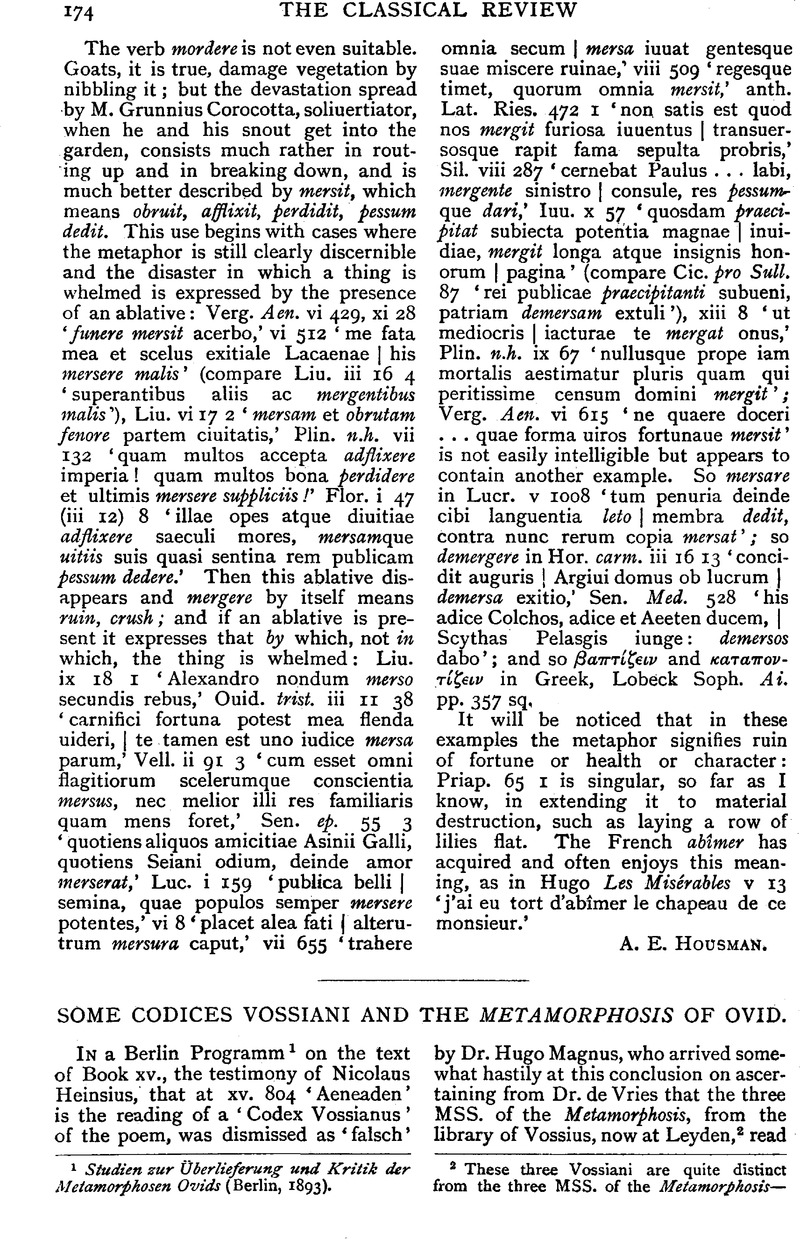No CrossRef data available.
Article contents
Some Codices Vossiani and the Metamorphosis of Ovid
Published online by Cambridge University Press: 27 October 2009
Abstract

- Type
- Original Contributions
- Information
- Copyright
- Copyright © The Classical Association 1915
References
page 174 note 1 Studien zur Überlieferung und Kritik der Metamorphosen Ovids (Berlin, 1893).
page 174 note 2 These three Vossiani are quite distinct from the three MSS. of the Metamorphosiscolviz., ‘BPL. 95–96’ (saec. xiv) and ‘BPL.'s 97p’ (saec. xiv)–in the general collection of the Leyden University Library ( = the ‘tres Leidenses’ cited from time to time by Heinsius and Burmann), for description of which see Codices MSS. Lugduni Batavorum (E. J. Brill, 1912).
page 175 note 1 ‘Further, I had at vii. 155 “sibi” for “ubi” (“ut coniecit” Merkel), a reading which, De Vries reports, is not to be found in either of the Leyden Vossiani.’
page 176 note 1 To M. Craster, of the Bodleian Library, I owe some assistance in deciphering this description and the suggestion that the second ‘adscriptis’ is a dittography. N. H. hesitated between two phrases (‘manu adscr. rec.’ and ‘adscr. denuo’), and failing to decide which fitted fitted the facts more aptly left them both standing.
page 176 note 2 Magnus follows it against the rest at xv. 570 as well as at 804.
page 176 note 3 See footnote. The prior Strozza (saec. xii. ineuntis) of Heinsius is also in the Laurentian Library. Among other notable readings it has ‘delo creteque’ at xv. 541 and ‘accenseor’ at xv. 546.
page 177 note 1 For ‘![]() ’ as a disyllable there is the authority of Virgil, but ‘
’ as a disyllable there is the authority of Virgil, but ‘![]() ’ I do not remember to have met elsewhere except in Accius (apud Nonium s.v. ‘vesci’)‘… accumbat mensam aut eandem oescatur dapem.’ Yet another possibility is ‘oectus et hunc molitur eadem condere sube,’ ‘eadē’ having fallen out before ‘cōdere.’
’ I do not remember to have met elsewhere except in Accius (apud Nonium s.v. ‘vesci’)‘… accumbat mensam aut eandem oescatur dapem.’ Yet another possibility is ‘oectus et hunc molitur eadem condere sube,’ ‘eadē’ having fallen out before ‘cōdere.’
page 177 note 2 The date is entered on the first page in Wanley's hand, ‘20 die Octobris, 1725’ (sic).
page 177 note 3 ‘The Library of J. G. Graevius.’
page 177 note 4 This he lent to Heinsius, who named it S (‘S = Codex Joh. Georgii Graevii, 400 annorum’), and has left us its readings registered under the siglum in X It is the MS. from which he restored ‘yi’ for ‘ut’ at vi. 690/691 and ‘ululatibus’ at vii. 190.
page 177 note 5 British Museum, Department of Printed Books, 126a 16.
page 177 note 6 ‘Cod. Harleianus 2610 … scriptus est, ut opinatur E. M. Thompson, cui submissa est cura codicum qui in Museo Britannico seruante, exeunte fere saeculo X., in Germania’ (R. Ellis, Anecd. Oxon., class, ser., vol. i., part v., p. v). See also Journal of Philology, xii. 65 ff. The discovery and discussion of this MS. was Ellis' chief contribution to the study of the Metamorphosis.
page 177 note 7 ‘Harl. 3595. Boethi Artis Arithmeticae libr. ii—de Musica [G(raevianus) 8] — Geometriae Euclidis libr. ii.’ sic ‘[G. 54]’ (Clark, op. cit., p. 371.
page 177 note 8 α is certainly, γ and π possibly, ninth century; but they are mere fragments, and in other respects are out of the question.
page 177 note 9 Lansdowne MS. 677.
page 177 note 10 The entry under date May, 1722, has not escaped me, but it is too vague to be regarded as closing this avenue of enquiry. Harleianus 2610 is a Quarto, and Wanley had not then seen the MSS., but only a list of them, from which ‘they seem to be,’ etc.
page 178 note 1 I note for what it is worth the fact that Graevius, according to his catalogue, possessed in MS. the ‘Observationes Gronovii in Metamorphosin Ovidii’ (G. 92). Now the restoration of vi. 200 to its proper place in the text was one of Gronovius’ most brilliant contributions to the criticism of the poem. If Graevius was interested in this particular problem, he may well have borrowed from Voss the fragment Vossianum (which alone among known MSS. supports the conjecture) in order to satisfy a very natural curiosity as to the general character of the codex which confirmed his friend the critic. But this is a long shot.




